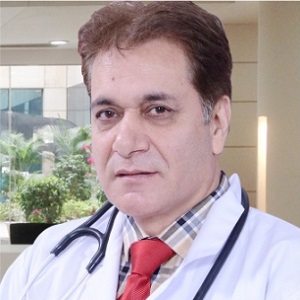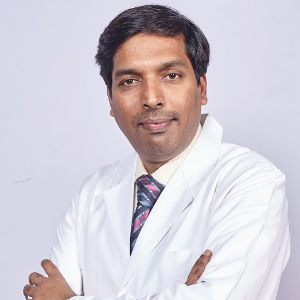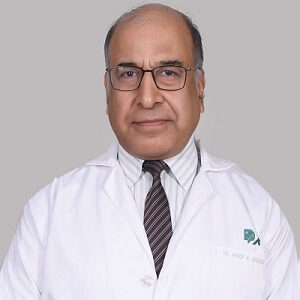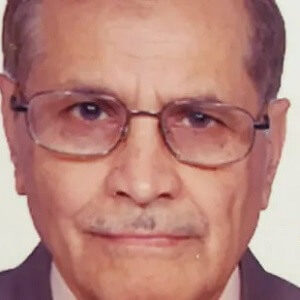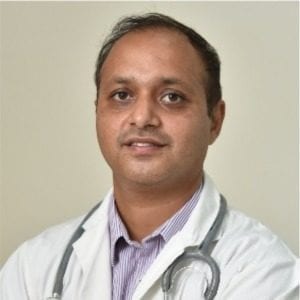Best Doctors in India for Alcoholic Hepatitis Treatment
- Gastroenterologist, Gurugram, India
- Over 17 years’ experience
- Artemis Hospital, Gurgaon
Profile Highlights:
- Dr. M A Mir is a well-known Gastroenterologist and Endoscopist with a vast experience of more than 17 years in the field of Gastroenterology.
- Before joining Artemis Hospital he was associated with Pushpawati Singhania Research Institute for Liver and Digestive Diseases, New Delhi as a Consultant Gastroenterologist and Endoscopist.
- He is experienced in all gastrointestinal procedures such as diagnostic and therapeutic upper and lower GI endoscopies.
- Radiation Oncologist, Chennai, India
- Over 24 years’ experience
- Apollo Cancer Centre
Profile Highlights:
- Dr. Rathna Devi is a senior Radiation Oncologist who has an experience of 24 years in the field.
- She completed MBBS from M.S. Ramaiah Medical College, Bangalore University, and a Diploma in Radio Treatment from Madras Medical College, Dr. MGR Medical University.
- Dr. Rathna Devi’s areas of expertise include Cranial Cyberknife Radiosurgery, Intensity Modulated Radio Treatment (IMRT), and Stereotactic Body Radio Treatment (SBRT).
- Dentist, Gurugram, India
- 20 + years’ experience
- Artemis Hospital, Gurgaon
Profile Highlights:
- Dr. Ateksha Bhardwaj Khanna is a distinguished dental professional with over 20 years of experience in the field of dentistry.
- Currently serving as the Head of Dentistry at Artemis Hospitals in Gurugram, Dr. Khanna is renowned for her expertise and leadership in providing top-tier dental care.
- An alumnus of the prestigious Maulana Azad Medical College, Delhi, and Bellevue Hospital Centre, NYU
- Top Ophthalmologist | Max Hospital, Saket, New Delhi, India
- 20+ Years Experience
- Max Super Specialty Hospital, Saket, New Delhi
Profile Highlights:
- Dr. Deepali Garg Mathur is a Consultant Ophthalmologist who has completed her DNB from the National Board of Examination & MNAMS from the National Board of Examination.
- Dr. Deepali Garg has expertise in Squint, Paediatric Ophthalmology, cataracts, Lasik, Lasers, Eye Surgery, Corneal, Phacoemulsification, Eyesight problems, Glaucoma, Dry Eyes, Eye Pain, etc.
- Liver Transplant & HPB Surgeon, Gurugram, India
- Over 20 years’ experience
- Fortis Memorial Research Institute
Profile Highlights:
- Dr. Ajitabh Srivastava is a reputed HPB and Liver Transplant surgeon in India.
- He has been a key member of teams that performed over 1500 liver transplants including living donors, deceased donors, pediatric transplants, and combined liver and kidney transplants.
- He is an expert in other complex procedures involving hepatobiliary surgery, combined liver, and Kidney Transplant, and vascular access surgery.
- Top Gastroenterologist & Hepatologist | Apollo Hospital, New Delhi, India
- 30+ Years Experience
- Indraprastha Apollo Hospital, New Delhi
Profile Highlights:
- Dr. Amitabha Dutta is a highly esteemed Gastroenterology and GI Medicine Specialist with over 30 years of distinguished experience in his field.
- He practices at Apollo Hospitals Indraprastha in New Delhi, where he offers expert care in diagnosing and treating a wide range of gastrointestinal conditions.
- He further advanced his qualifications with prestigious fellowships, earning FRCP from The Royal College of Physicians of Ireland in 2014 and FRCP from the Royal College of Physicians, London in 2015
- Top Cardiothoracic Surgeon and Vascular Surgeon | Apollo Hospital, New Delhi, India
- 42+ Years Experience
- Indraprastha Apollo Hospital, New Delhi
Profile Highlights:
- Dr. Anoop K Ganjoo is one of the best cardiologists & cardiothoracic surgeons in India with a total experience of 42 years.
- Dr. Ganjoo has a rich experience of over two decades in several complicated procedures, like Mitral valve repair and replacement, Peripheral and Coronary angiography & angioplasty, vascular surgery, ICD, diffuse coronary artery disease, Pacemaker, Radiofrequency ablation of arrhythmias, adult Cardiothoracic Surgery, CRT implantation, Balloon valvuloplasty, and PDA device closure.
- Top Ophthalmologist | Apollo Hospital, New Delhi, India
- 36+ Years Experience
- Indraprastha Apollo Hospital, New Delhi
Profile Highlights:
- With over 36 years of experience, Dr. Ranjana Mithal is currently practicing at Indraprastha Hospitals in Delhi. Her expertise lies in providing services for diabetic eye ailments, laser eye surgeries, glaucoma treatment as well as phaco-surgery.
- She has also gained additional specialization in LASIK & Neuro-ophthalmology.
- Dr. Ranjana Mithal is a member of several associations as well, such as the Glaucoma Society of India, and the Cataract & Refractive Society of India.
- Top ENT Surgeon | Apollo Hospital, New Delhi, India
- 45+ Years Experience
- Indraprastha Apollo Hospital, New Delhi
Profile Highlights:
- Dr. Dhingra is one of the best ENT surgeons in India with experience of over 45 years in the field.
- He is the senior consultant ENT with Indraprastha Apollo Hospitals, New Delhi. The veteran doctor is practicing in the area since 1965 and specializes in Ear, Nose, Throat, and Head & Neck Surgery.
- Dr. P L Dhingra has a special interest in ear surgery for alleviating deafness, endoscopic surgery of the nose and sinuses, and Microsurgery for voice disorders.
- Dr. Dhingra has held many prominent positions in his career; that included Medical Superintendent of the University College of Medical Sciences and GTB Hospital, Delhi.
- He penned many books, including a self-assessment manual; and articles in national and international journals.
- ENT, Head & Neck Surgeon, Gurugram, India
- Over 20 years’ experience
- Artemis Hospital, Gurgaon
Profile Highlights:
- Dr. Shashidhar TB is a highly skilled and experienced ENT and Head & Neck Surgeon with a remarkable background in handling complex and challenging cases, currently working at Artemis Hospital, Gurugram as Head Surgery (ENT)
- He holds an M.B.B.S. and an M.S. in ENT from prestigious institutions in India and has further enhanced his expertise with specialized training in the United States and Europe.
- His clinical interests include pediatric otolaryngology, sleep and airway surgery, swallowing disorders, and general ENT.
Best Hospitals in India for Alcoholic Hepatitis Treatment
ALCOHOLIC HEPATITIS
Alcoholic hepatitis is a liver infection, which is mainly caused by frequent, heavy use of alcohol. Fat can build up in the liver cells, which might lead to inflammation as well as scarring of the liver.
Alcoholic hepatitis might be mild or severe. A patient might even need a liver transplant if proper treatment is not provided, or if they don’t stop consumption of alcohol.
It is also notable that all heavy drinkers don’t develop this condition, and sometimes this condition even develops in people who drink moderately. However, if you are diagnosed with this condition, it is important for you to quit drinking alcohol. People who continue drinking alcohol might face a huge risk of serious liver damage as well as death.
Symptoms
Depending on the amount of damage to the liver, the symptoms can vary. If you are having a mild form of the disease, you might not even experience any symptoms at all. However, as the damage continues to grow, you might experience the following:
- Changes in appetite
- Dry mouth
- Weight loss
- Pain or swelling in the abdomen
- Jaundice, or yellowing of the skin or eyes
- Fever
- Nausea and vomiting
- Easy bleeding or bruising
- Changes in your mental state, including confusion
- Fatigue
The symptoms of this condition are similar to those caused by a few other health conditions. Therefore, if you develop any of these symptoms, it is best to get a proper diagnosis as well as begin treatment.
Causes & risk factors
Alcoholic hepatitis generally develops when the alcohol you drink causes damage to your liver. However, it is not clear why alcohol does this damages only to some heavy drinkers.
Few factors that are known to play a role in this condition include:
- The body’s process that breaks down alcohol produces some toxic chemicals
- These chemicals can trigger inflammation that can destroy the liver cells
- Thus, over time, scars replace healthy liver tissue, thus interfering with the function of the liver
- This irreversible scarring, which is also termed cirrhosis, is the final stage of alcoholic liver disease
If you have hepatitis C and continue to drink, even moderately, you are more likely to develop cirrhosis.
Some heavy drinkers are also malnourished because they don’t eat a proper balanced diet. Alcohol and its byproducts also prevent the body from absorbing nutrition properly. Lack of nutrition can contribute to liver cell damage.
Some other risk factors that can lead to this condition include:
- Your sex- Women are usually at a higher risk of developing alcoholic hepatitis since the way alcohol is processed in women is different.
- Binge drinking- Having over five drinks within two hours for men and four or more for women can increase the risk of alcoholic hepatitis.
- Obesity- Heavy drinkers who are overweight are also more likely to develop alcoholic hepatitis and to progress from that condition to cirrhosis.
- Race and ethnicity- Hispanic and Negroid people might be at higher risk of alcoholic hepatitis.
- Genetic factors- According to studies, there may be a genetic component in alcohol-induced liver disease. However, it is difficult to separate genetic and environmental factors.
Diagnosis
If you are showing symptoms of alcoholic hepatitis, your doctor will first inquire about your medical history and alcohol consumption. Next, he/she will perform a physical exam to see if you have an enlarged liver or spleen. They might also need a few more tests to confirm your diagnosis, such as:
- Complete blood count (CBC)
- Liver function test
- Ultrasound of the liver
- Abdominal CT scan
- Blood clotting tests
In some cases, a liver biopsy might also be needed to confirm the diagnosis of alcoholic hepatitis. A liver biopsy requires your doctor to remove a tissue sample from your liver, which is then tested in the lab. This method helps to show the severity and type of liver disease.
Treatment
Stopping alcohol consumption is the most important treatment for alcoholic hepatitis. There is no cure for this condition, but treatment can help in reducing or eliminating symptoms, or stopping its progression.
It is also important to note that scarring of the liver is permanent, but treatment can aim to restore as much function as possible.
Dietary changes
Medication
Liver transplant
The best hope of recovery is to be aware of the signs and symptoms as well as to reduce, manage, or if possible, completely stop consumption of alcohol.
Complications
Alcoholic hepatitis might lead to severe other complications such as:
- Enlarged veins (varices)- In this condition, blood that is unable to flow freely through the portal vein, can back up into other blood vessels in your esophagus or stomach.
- Hepatic encephalopathy- This condition can be caused by the buildup of toxins if your damaged liver is unable to remove all the toxins from your body. It involves confusion, drowsiness, and slurred speech.
- Ascites- Ascites is a condition in which the fluid that accumulates in the abdomen may get infected and thus, require treatment with antibiotics. Although this condition is not life-threatening, it can be a sign of advanced alcoholic hepatitis, or cirrhosis.
- Kidney failure- A damaged liver affects blood flow to the kidneys, thus resulting in kidney failure.
- Cirrhosis- The scarring of the liver might lead to liver failure.
Prevention
Alcoholic hepatitis might be prevented if you take the following steps:
- Drink alcohol in moderation, if at all- For healthy adults, moderate drinking means no more than one drink a day for women of all ages and men older than 65, and not over two drinks a day for men aged 65 and younger. However, if you prevent all alcohol, it is a certain way to prevent this condition.
- Check before mixing medications and alcohol- Ask your doctor if it’s safe to drink alcohol while you are taking medications. Consider reading the warning labels on over-the-counter medications as well. Don’t drink alcohol when you are taking medications that warn of complications when combined with alcohol.
- Protect yourself from hepatitis C- Hepatitis C is an infectious liver disease that is caused by a virus. If it is left untreated, it may lead to cirrhosis. If you are having hepatitis C and you consume alcohol, you’re generally more likely to develop cirrhosis than if you don’t drink.

